牛津译林版(2019)必修 第二册Unit 3 Festivals and customs Grammar and usage 课件(共25张PPT)
文档属性
| 名称 | 牛津译林版(2019)必修 第二册Unit 3 Festivals and customs Grammar and usage 课件(共25张PPT) |
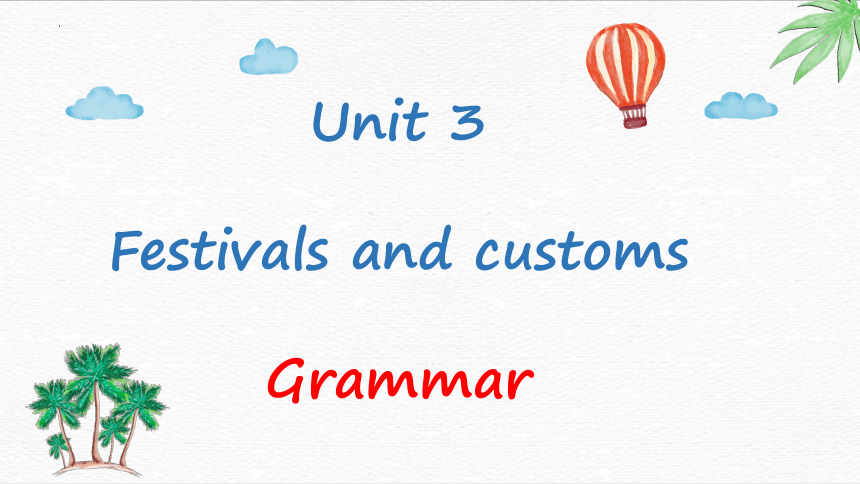
|
|
| 格式 | pptx | ||
| 文件大小 | 10.9MB | ||
| 资源类型 | 教案 | ||
| 版本资源 | 牛津译林版(2019) | ||
| 科目 | 英语 | ||
| 更新时间 | 2024-03-16 00:00:00 | ||
图片预览


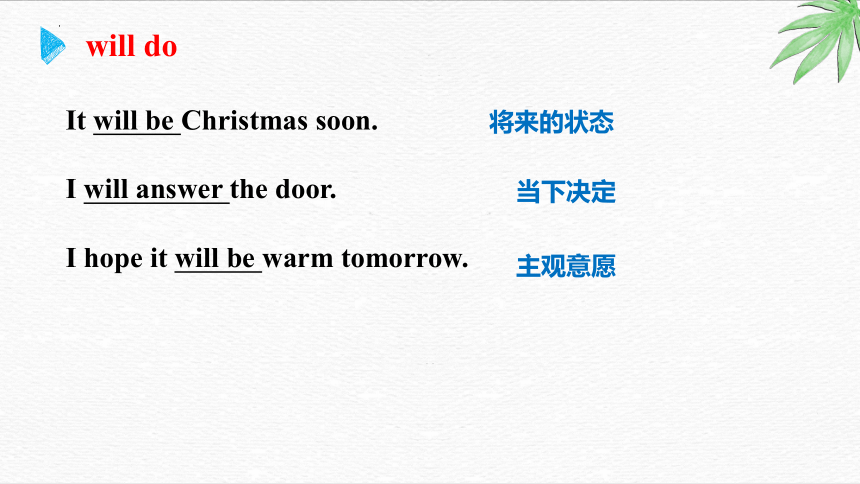
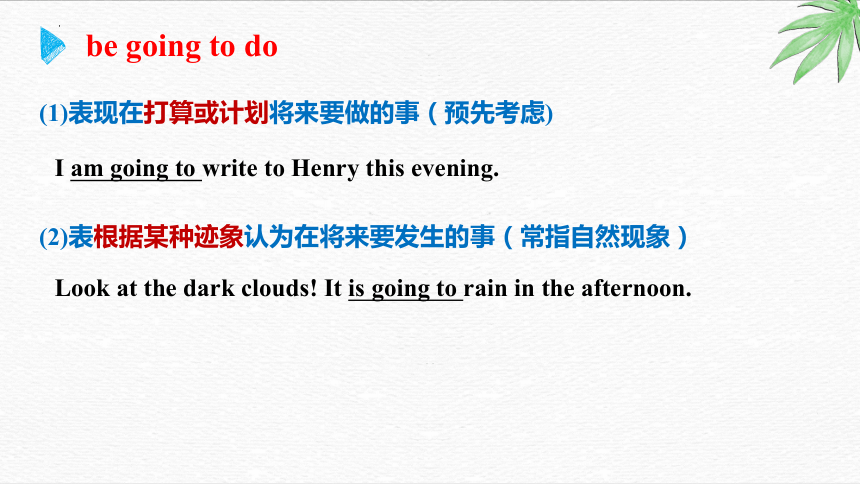
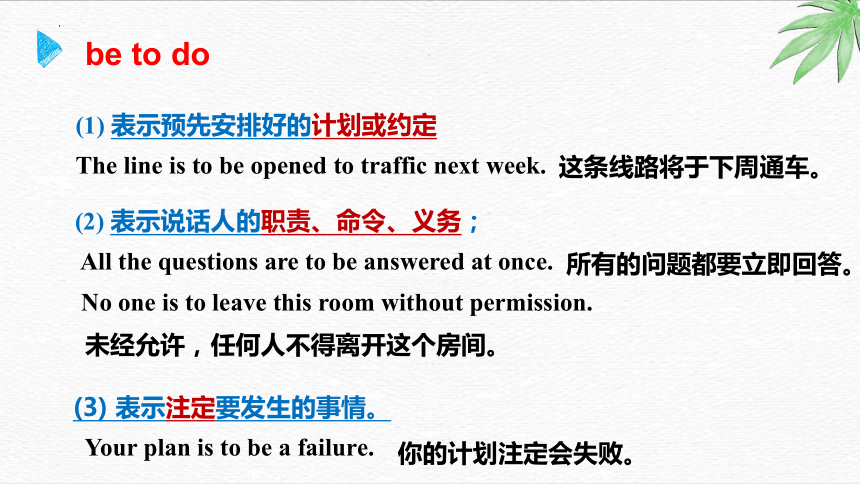
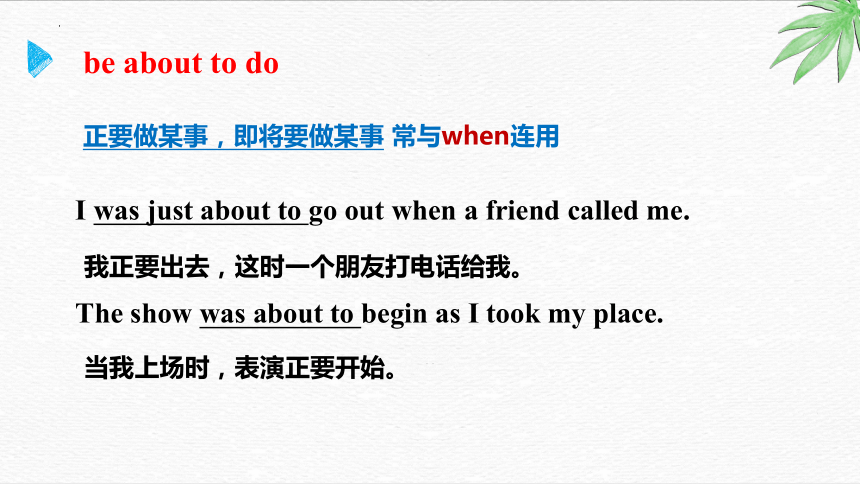
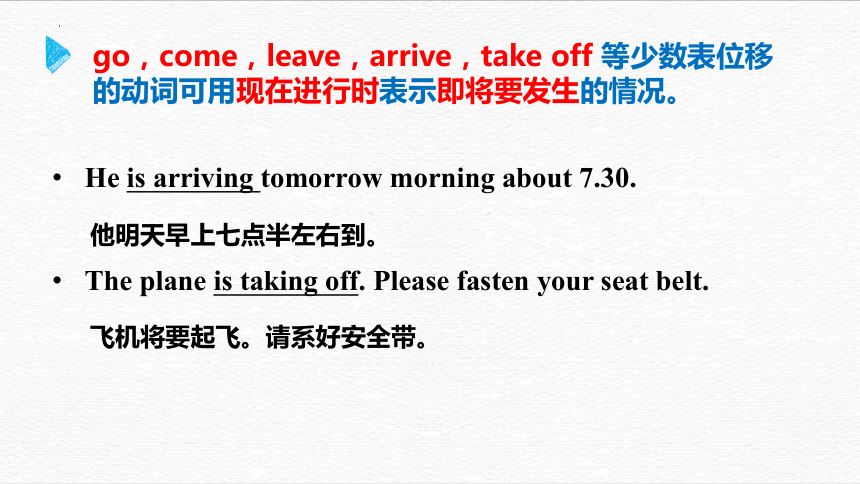
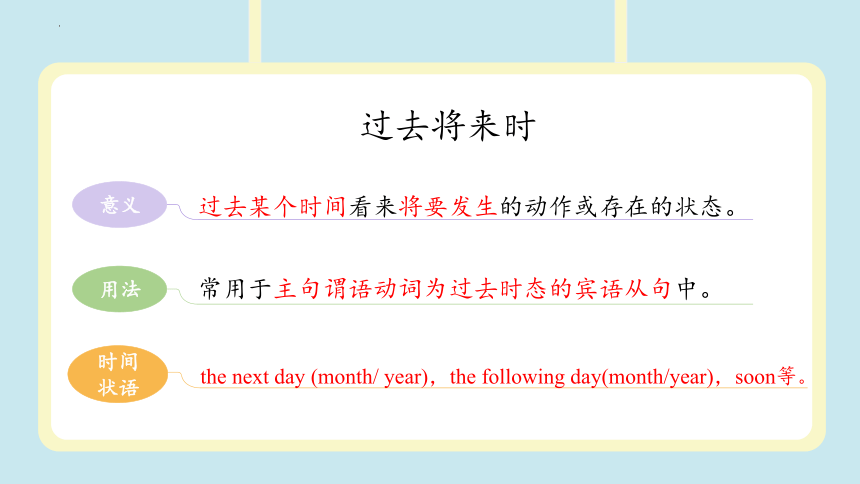
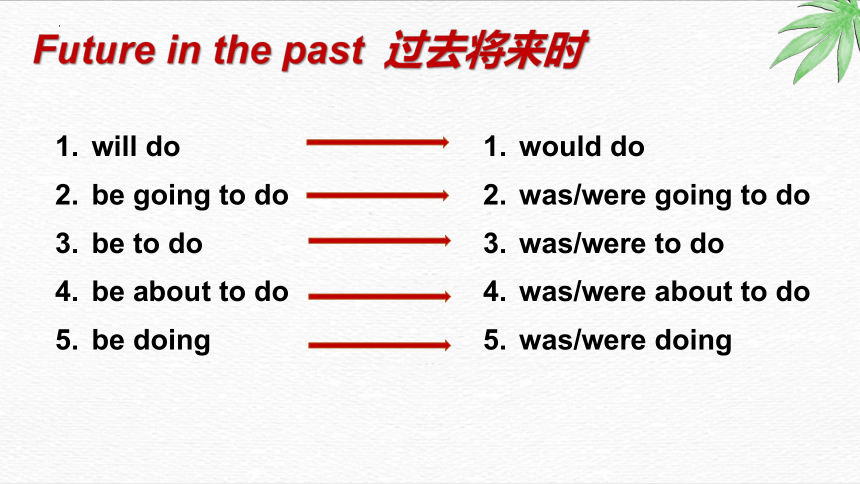
文档简介
(共25张PPT)
Unit 3
Festivals and customs
Grammar
How to describe future actions
shall/will do
be going to do
be to do
be about to do
be doing
将来的状态
will do
当下决定
It will be Christmas soon.
I will answer the door.
I hope it will be warm tomorrow.
主观意愿
(1)表现在打算或计划将来要做的事(预先考虑)
be going to do
(2)表根据某种迹象认为在将来要发生的事(常指自然现象)
I am going to write to Henry this evening.
Look at the dark clouds! It is going to rain in the afternoon.
(2) 表示说话人的职责、命令、义务;
All the questions are to be answered at once.
No one is to leave this room without permission.
be to do
(3) 表示注定要发生的事情。
Your plan is to be a failure.
(1) 表示预先安排好的计划或约定
The line is to be opened to traffic next week.
这条线路将于下周通车。
所有的问题都要立即回答。
未经允许,任何人不得离开这个房间。
你的计划注定会失败。
I was just about to go out when a friend called me.
The show was about to begin as I took my place.
be about to do
正要做某事,即将要做某事 常与when连用
我正要出去,这时一个朋友打电话给我。
当我上场时,表演正要开始。
go,come,leave,arrive,take off 等少数表位移的动词可用现在进行时表示即将要发生的情况。
He is arriving tomorrow morning about 7.30.
The plane is taking off. Please fasten your seat belt.
他明天早上七点半左右到。
飞机将要起飞。请系好安全带。
过去将来时
用法
常用于主句谓语动词为过去时态的宾语从句中。
时间状语
the next day (month/ year),the following day(month/year),soon等。
意义
过去某个时间看来将要发生的动作或存在的状态。
will do
be going to do
be to do
be about to do
be doing
Future in the past 过去将来时
would do
was/were going to do
was/were to do
was/were about to do
was/were doing
用法1
(1) would+动词原形,表示从过去某时看来将要发生的动作或存在状态,还表示主观意愿的将来。
例:1. He said he would come to see me.
2. He promised to his father he would not give up.
过去将来时的构成(1)
否定式: would后面加not
他说他会来看我。
他向他父亲保证他不会放弃。
用法2
(2) was/ were + going to +动词原形,常表示根据计划或安排即将发生的事。
例:1. She said she was going to start off at once.
2. It seemed as if it was going to rain.
过去将来时的构成(2)
还可表示根据某种迹象来看,很可能或即将发生的事情。
她说她马上就出发。
看来天要下雨了。
用法3
过去将来时的构成(3)
(3) was/were to +动词原形,表示过去某时间内计划/打算或一定要进行的动作。
据报道,要再建一座桥。
她说她放学后要打扫教室。
2. She said she was to clean the classroom after school.
1. It was reported that another bridge was to be built.
用法4
过去将来时的构成(4)
(4) was/were about to +动词原形,表示“正要、即将”
表示说话的瞬间就会发生的动作。不与表示时间段的状语连用。
常用句型:were/was about to…when…;
were/was on the point of doing…when…。
1. I felt something terrible was about to happen.
2. He said that the train was about to leave.
我觉得有可怕的事情要发生了
他说火车就要开了。
3.I was about to leave the house when a postman came
我正要离开家,这时邮递员来了
用法5
过去将来时的构成(5)
(5) come, go, leave, arrive, start等表示位移的动词可用过去进行时代替过去将来时。
例如:He said the train was leaving at six the next morning.
他说火车将于第二天早晨六点离开。
She told me she was coming to see me.
她告诉我她要来看我。
用法6
过去将来时的构成(6)
(5) 在条件和时间状语从句中,要表示过去将来须用一般过去时代替过去将来时。
*He said he would call me as soon as the result came out.
他说结果一出来他就给我打电话。
*I promised that I would visit him if it didn’t rain that day.
我许诺如果那天不下雨的话我就去看望他。
课 堂 学 习
Below is a story about how Della prepared a gift for her husband Jim during the Christmas season. Find the sentences that use future in the past and fill in the box below. The first one has been done for you.
ONE DOLLAR AND EIGHTY-SEVEN CENTS. That was all she had. Della counted it three times. One dollar and eighty-seven cents. And the next day would be Christmas. If she was to buy a nice gift for her husband Jim, she would need more money. But how could she earn some Della stood in front of the mirror in her apartment. She looked at her reflection, brushed her long, brown hair, and made up her mind: she was going to sell her hair. With the money she received for it, she would buy Jim a perfect gift.
Della had her hair cut off and sold it for twenty dollars. She spent the next two hours hunting for Jim's gift. She found it at last: a simple but beautiful watch chain for his gold watch, which had been passed down to him from his grandfather. Della paid twenty-one dollars for the watch chain, and hurried home with the remaining eighty-seven cents. She looked at her reflection in the mirror carefully again. She felt nervous. Did she look like a little schoolboy without her beautiful long hair Would Jim still think she was pretty She was about to find out.
Read the story again, find the sentences that use future in the past and fill in the box of Part A on page 34 .
1. And the next day would be Christmas.
2. If she was to buy a nice gift for her husband Jim, she would need more money.
3. ... she was going to sell her hair.
4. ... she would buy Jim a perfect gift.
5. Would Jim still think she was pretty
6. She was about to find out.
earn vt.&vi. 赚得;获利;赢得
(1)earn sb.sth. 为某人赢得某事/物; 为某人带来某事/物
earn a living (make a living) by... 靠……谋生
earn a fame/a reputation 赢得名誉
(2)earnings n.收入, 所得; 工资, 报酬
He earned ____(he) living by selling vegetables after graduation.
He is satisfied with his _________(earn) as a civil servant.
his
earnings
hunt vt.&vi.寻找;打猎
(1)hunt for 寻找,搜寻
hunt out 找出,搜寻出
(2)hunter n.猎人
They are still hunting ____ the missing child.
In the school library he hunted ____ books on politics.
for
out
pass down 使世代相传,流传
pass away 去世, 消失, 逝世
pass by 经过
pass on sth.to sb. 把……传递给某人
他父母去世后, 他不得不靠自己谋生。
After his parents ____________, he had to earn his living on his own. 【词汇复现】
passed away
Working out the rules
We use future in the past to describe an action (1)___________ (in the future/in the past) from the perspective of some point (2)__________ (in the future/in the past).
We form future in the past in statements by using (3)________, was/were to, (4)________________ or was/were about to with
the base form of a verb.
in the future
in the past
would
was/were going to
Present
Future in the past
Past
Future
Complete the conversations with the correct expressions
in the brackets.
B1
B Applying the rules
Paul: I (a) _________ (visited/was about to visit) the museum with
my friends last weekend. What about you
Emily: I (b) ______________ (saw/was going to see) a documentary
film about the Spring Festival with Joanna on Saturday, but
she didn’t feel well. So I just stayed at home.
visited
was going to see
Alex: We (a) _________________ (are going to hand in/were going to hand in)
our report on festivals around the world next Monday.
Colin: Yes, but I (b) _________________ (wasn’t to start/haven’t started) it yet.
Alex: You told me you (c) _________________ (would work on/worked on) it
all day yesterday.
Colin: Oh, I (d) _________________ (was about to start/would start) when my
cousin (e) _______ (would come/came) over.
are going to hand in
haven’t started
would work on
was about to start
came
Below is a story about Jim's gift for plete the story with the correct verbs in the box below, using future in the past. Some verbs can be used more than once.
B2
make think be sell
Jim was shopping for a gift for his wife Della. The next day (1) ________ Christmas. With an income of twenty dollars per week, life was hard for the couple, but Jim wanted to buy a perfect gift for Della. He thought of the beautiful set of combs on show in one of the shop windows on Broadway. Della had wanted those combs for so long. Tomorrow, Jim decided, he (2)_____________________________ Della’s dream come true.
would be
was going to make/would make
make think be sell
Jim looked at the gold watch that had been his father's and his grandfathers. He and Della owned two things which they were both very proud of. One was Jim’s gold watch, and the other was Della's beautiful hair. Jim already knew what he had to do: he (3) _________________________ his watch.
That afternoon, Jim sold the watch, went to the shop for the combs and returned home with a package in his pocket. He was sure that they(4) ________________________ the most wonderful gift for Della. Jim was excited about what she (5)___________________________ when she saw her gift the next day.
would sell/ was going to sell
would be/ were going to be
was going to think/ would think
Unit 3
Festivals and customs
Grammar
How to describe future actions
shall/will do
be going to do
be to do
be about to do
be doing
将来的状态
will do
当下决定
It will be Christmas soon.
I will answer the door.
I hope it will be warm tomorrow.
主观意愿
(1)表现在打算或计划将来要做的事(预先考虑)
be going to do
(2)表根据某种迹象认为在将来要发生的事(常指自然现象)
I am going to write to Henry this evening.
Look at the dark clouds! It is going to rain in the afternoon.
(2) 表示说话人的职责、命令、义务;
All the questions are to be answered at once.
No one is to leave this room without permission.
be to do
(3) 表示注定要发生的事情。
Your plan is to be a failure.
(1) 表示预先安排好的计划或约定
The line is to be opened to traffic next week.
这条线路将于下周通车。
所有的问题都要立即回答。
未经允许,任何人不得离开这个房间。
你的计划注定会失败。
I was just about to go out when a friend called me.
The show was about to begin as I took my place.
be about to do
正要做某事,即将要做某事 常与when连用
我正要出去,这时一个朋友打电话给我。
当我上场时,表演正要开始。
go,come,leave,arrive,take off 等少数表位移的动词可用现在进行时表示即将要发生的情况。
He is arriving tomorrow morning about 7.30.
The plane is taking off. Please fasten your seat belt.
他明天早上七点半左右到。
飞机将要起飞。请系好安全带。
过去将来时
用法
常用于主句谓语动词为过去时态的宾语从句中。
时间状语
the next day (month/ year),the following day(month/year),soon等。
意义
过去某个时间看来将要发生的动作或存在的状态。
will do
be going to do
be to do
be about to do
be doing
Future in the past 过去将来时
would do
was/were going to do
was/were to do
was/were about to do
was/were doing
用法1
(1) would+动词原形,表示从过去某时看来将要发生的动作或存在状态,还表示主观意愿的将来。
例:1. He said he would come to see me.
2. He promised to his father he would not give up.
过去将来时的构成(1)
否定式: would后面加not
他说他会来看我。
他向他父亲保证他不会放弃。
用法2
(2) was/ were + going to +动词原形,常表示根据计划或安排即将发生的事。
例:1. She said she was going to start off at once.
2. It seemed as if it was going to rain.
过去将来时的构成(2)
还可表示根据某种迹象来看,很可能或即将发生的事情。
她说她马上就出发。
看来天要下雨了。
用法3
过去将来时的构成(3)
(3) was/were to +动词原形,表示过去某时间内计划/打算或一定要进行的动作。
据报道,要再建一座桥。
她说她放学后要打扫教室。
2. She said she was to clean the classroom after school.
1. It was reported that another bridge was to be built.
用法4
过去将来时的构成(4)
(4) was/were about to +动词原形,表示“正要、即将”
表示说话的瞬间就会发生的动作。不与表示时间段的状语连用。
常用句型:were/was about to…when…;
were/was on the point of doing…when…。
1. I felt something terrible was about to happen.
2. He said that the train was about to leave.
我觉得有可怕的事情要发生了
他说火车就要开了。
3.I was about to leave the house when a postman came
我正要离开家,这时邮递员来了
用法5
过去将来时的构成(5)
(5) come, go, leave, arrive, start等表示位移的动词可用过去进行时代替过去将来时。
例如:He said the train was leaving at six the next morning.
他说火车将于第二天早晨六点离开。
She told me she was coming to see me.
她告诉我她要来看我。
用法6
过去将来时的构成(6)
(5) 在条件和时间状语从句中,要表示过去将来须用一般过去时代替过去将来时。
*He said he would call me as soon as the result came out.
他说结果一出来他就给我打电话。
*I promised that I would visit him if it didn’t rain that day.
我许诺如果那天不下雨的话我就去看望他。
课 堂 学 习
Below is a story about how Della prepared a gift for her husband Jim during the Christmas season. Find the sentences that use future in the past and fill in the box below. The first one has been done for you.
ONE DOLLAR AND EIGHTY-SEVEN CENTS. That was all she had. Della counted it three times. One dollar and eighty-seven cents. And the next day would be Christmas. If she was to buy a nice gift for her husband Jim, she would need more money. But how could she earn some Della stood in front of the mirror in her apartment. She looked at her reflection, brushed her long, brown hair, and made up her mind: she was going to sell her hair. With the money she received for it, she would buy Jim a perfect gift.
Della had her hair cut off and sold it for twenty dollars. She spent the next two hours hunting for Jim's gift. She found it at last: a simple but beautiful watch chain for his gold watch, which had been passed down to him from his grandfather. Della paid twenty-one dollars for the watch chain, and hurried home with the remaining eighty-seven cents. She looked at her reflection in the mirror carefully again. She felt nervous. Did she look like a little schoolboy without her beautiful long hair Would Jim still think she was pretty She was about to find out.
Read the story again, find the sentences that use future in the past and fill in the box of Part A on page 34 .
1. And the next day would be Christmas.
2. If she was to buy a nice gift for her husband Jim, she would need more money.
3. ... she was going to sell her hair.
4. ... she would buy Jim a perfect gift.
5. Would Jim still think she was pretty
6. She was about to find out.
earn vt.&vi. 赚得;获利;赢得
(1)earn sb.sth. 为某人赢得某事/物; 为某人带来某事/物
earn a living (make a living) by... 靠……谋生
earn a fame/a reputation 赢得名誉
(2)earnings n.收入, 所得; 工资, 报酬
He earned ____(he) living by selling vegetables after graduation.
He is satisfied with his _________(earn) as a civil servant.
his
earnings
hunt vt.&vi.寻找;打猎
(1)hunt for 寻找,搜寻
hunt out 找出,搜寻出
(2)hunter n.猎人
They are still hunting ____ the missing child.
In the school library he hunted ____ books on politics.
for
out
pass down 使世代相传,流传
pass away 去世, 消失, 逝世
pass by 经过
pass on sth.to sb. 把……传递给某人
他父母去世后, 他不得不靠自己谋生。
After his parents ____________, he had to earn his living on his own. 【词汇复现】
passed away
Working out the rules
We use future in the past to describe an action (1)___________ (in the future/in the past) from the perspective of some point (2)__________ (in the future/in the past).
We form future in the past in statements by using (3)________, was/were to, (4)________________ or was/were about to with
the base form of a verb.
in the future
in the past
would
was/were going to
Present
Future in the past
Past
Future
Complete the conversations with the correct expressions
in the brackets.
B1
B Applying the rules
Paul: I (a) _________ (visited/was about to visit) the museum with
my friends last weekend. What about you
Emily: I (b) ______________ (saw/was going to see) a documentary
film about the Spring Festival with Joanna on Saturday, but
she didn’t feel well. So I just stayed at home.
visited
was going to see
Alex: We (a) _________________ (are going to hand in/were going to hand in)
our report on festivals around the world next Monday.
Colin: Yes, but I (b) _________________ (wasn’t to start/haven’t started) it yet.
Alex: You told me you (c) _________________ (would work on/worked on) it
all day yesterday.
Colin: Oh, I (d) _________________ (was about to start/would start) when my
cousin (e) _______ (would come/came) over.
are going to hand in
haven’t started
would work on
was about to start
came
Below is a story about Jim's gift for plete the story with the correct verbs in the box below, using future in the past. Some verbs can be used more than once.
B2
make think be sell
Jim was shopping for a gift for his wife Della. The next day (1) ________ Christmas. With an income of twenty dollars per week, life was hard for the couple, but Jim wanted to buy a perfect gift for Della. He thought of the beautiful set of combs on show in one of the shop windows on Broadway. Della had wanted those combs for so long. Tomorrow, Jim decided, he (2)_____________________________ Della’s dream come true.
would be
was going to make/would make
make think be sell
Jim looked at the gold watch that had been his father's and his grandfathers. He and Della owned two things which they were both very proud of. One was Jim’s gold watch, and the other was Della's beautiful hair. Jim already knew what he had to do: he (3) _________________________ his watch.
That afternoon, Jim sold the watch, went to the shop for the combs and returned home with a package in his pocket. He was sure that they(4) ________________________ the most wonderful gift for Della. Jim was excited about what she (5)___________________________ when she saw her gift the next day.
would sell/ was going to sell
would be/ were going to be
was going to think/ would think
